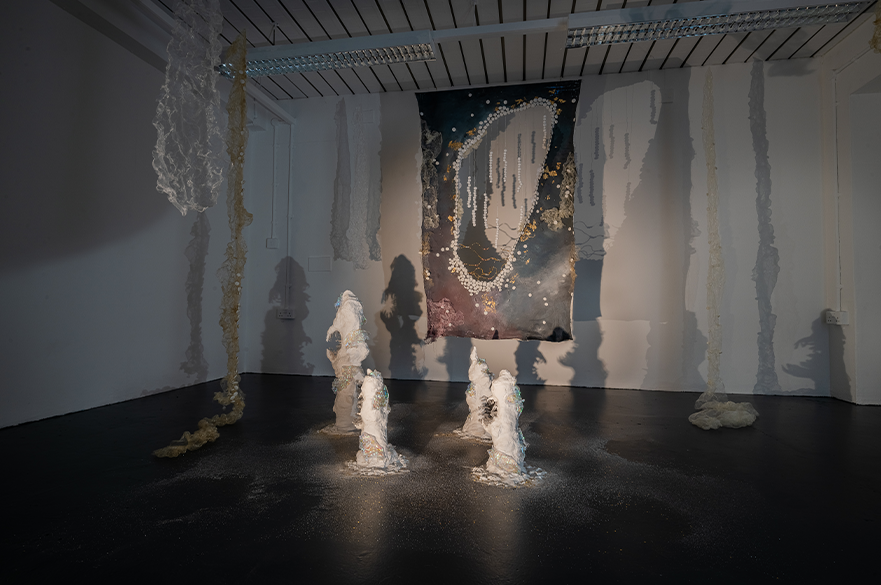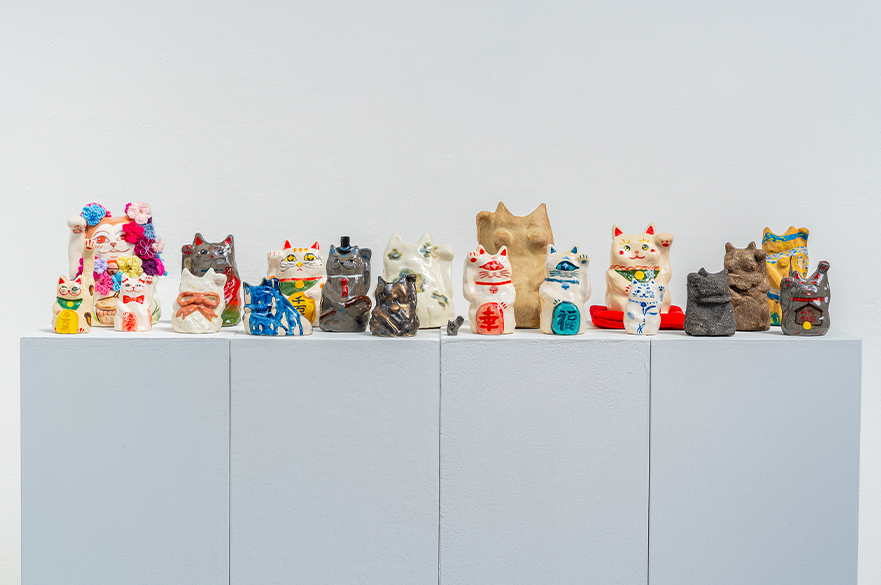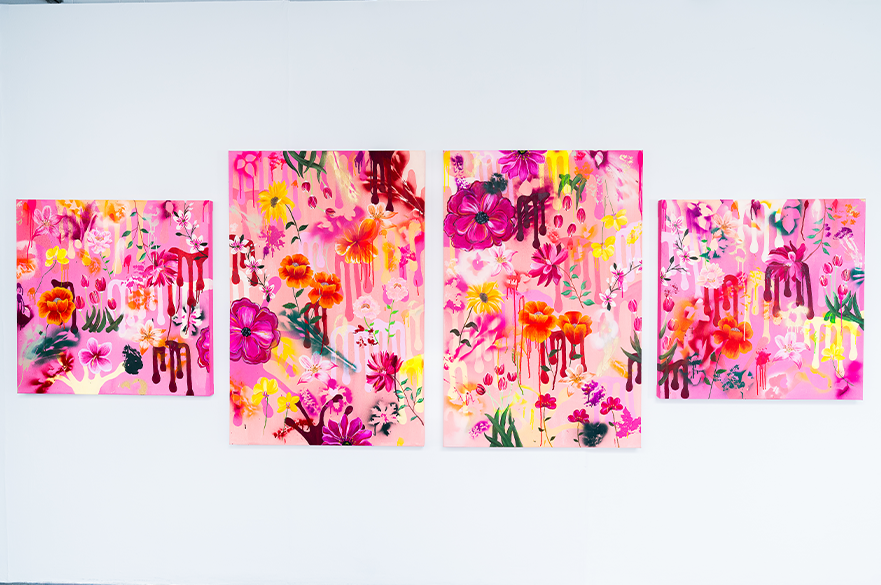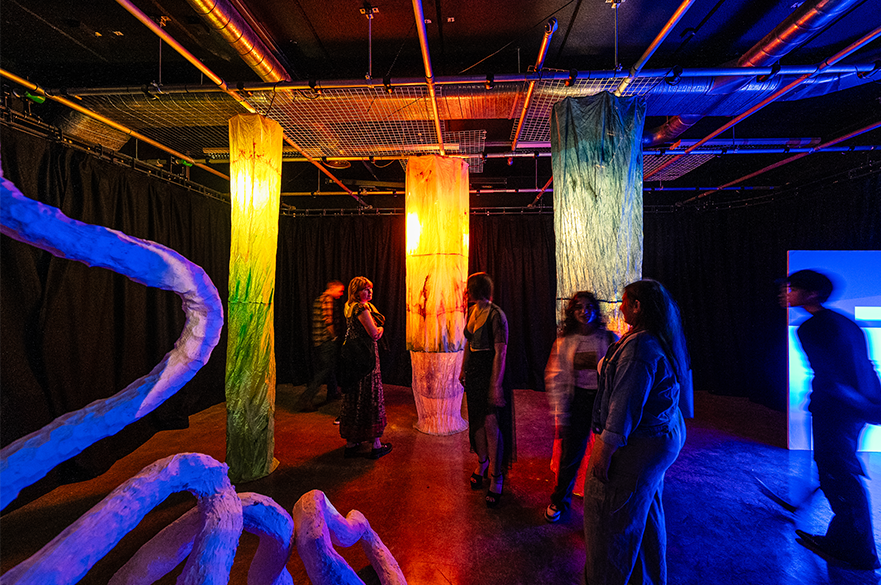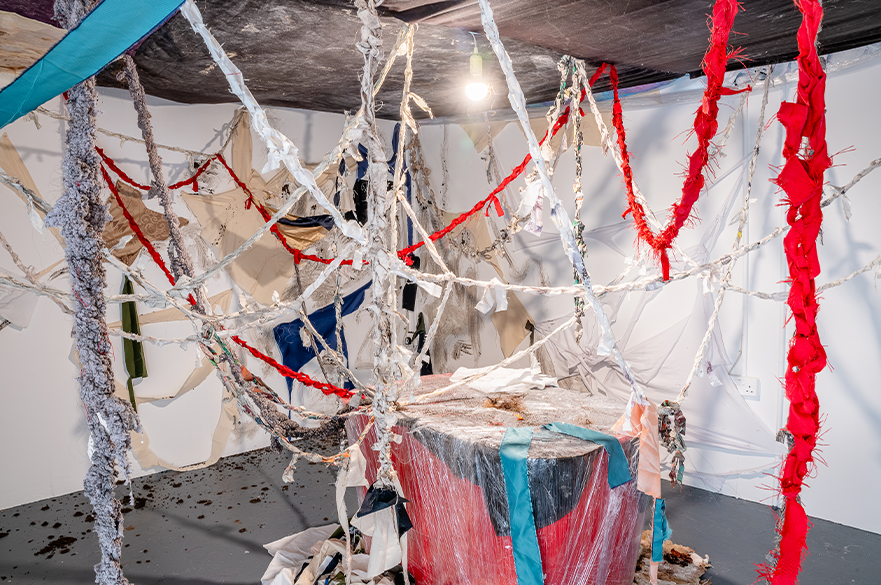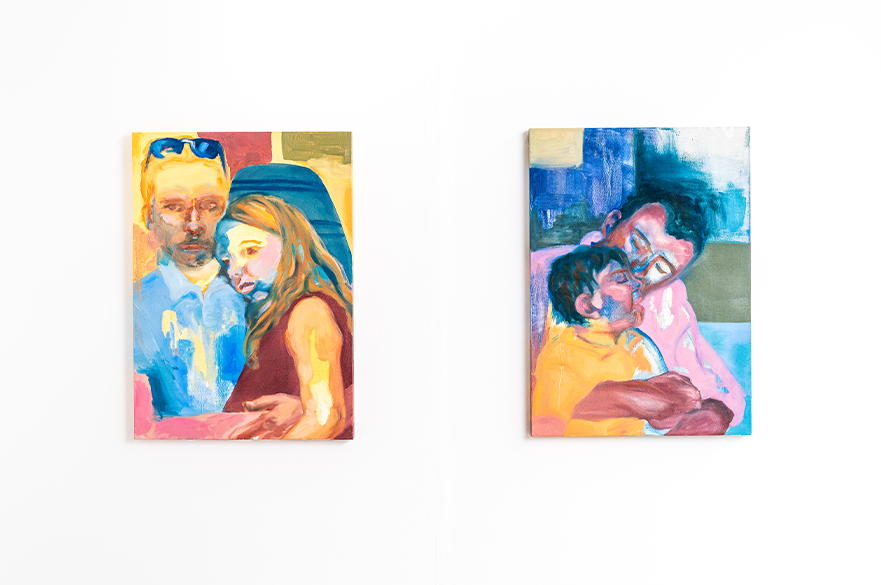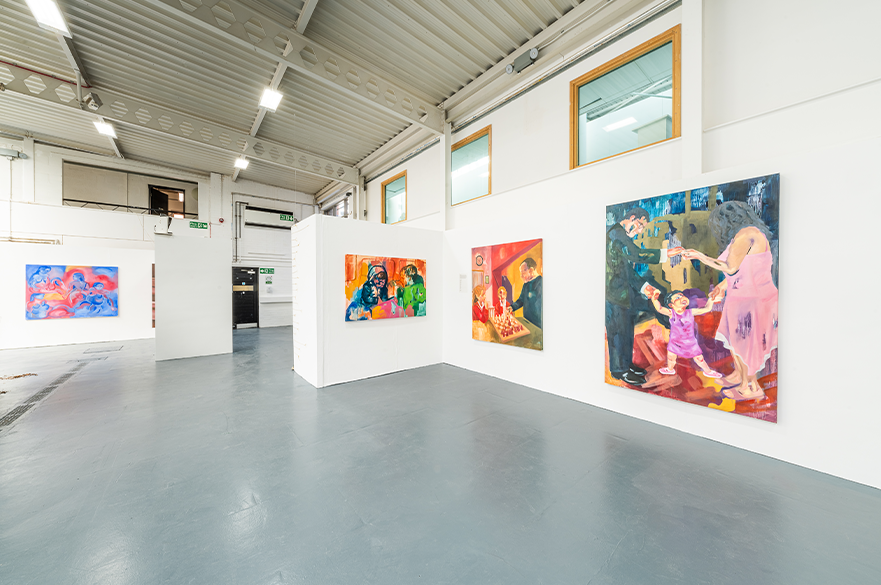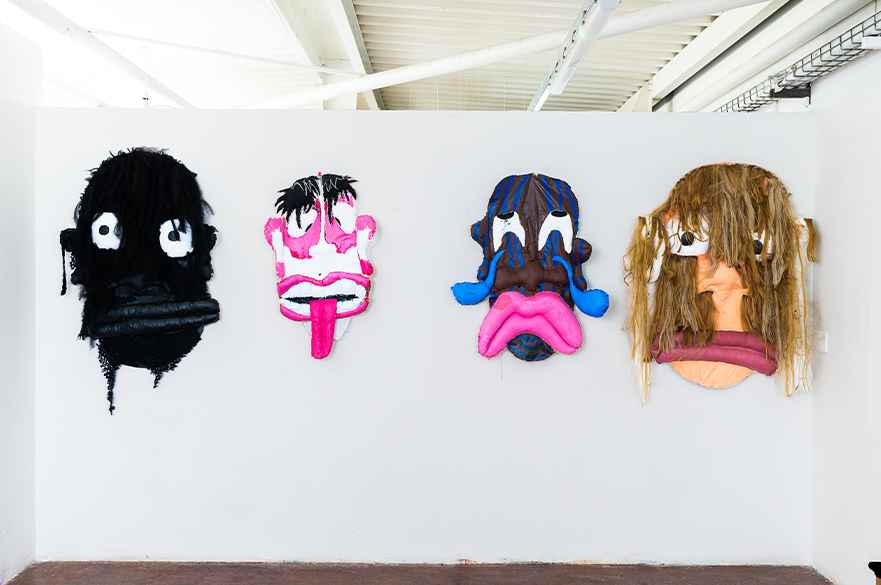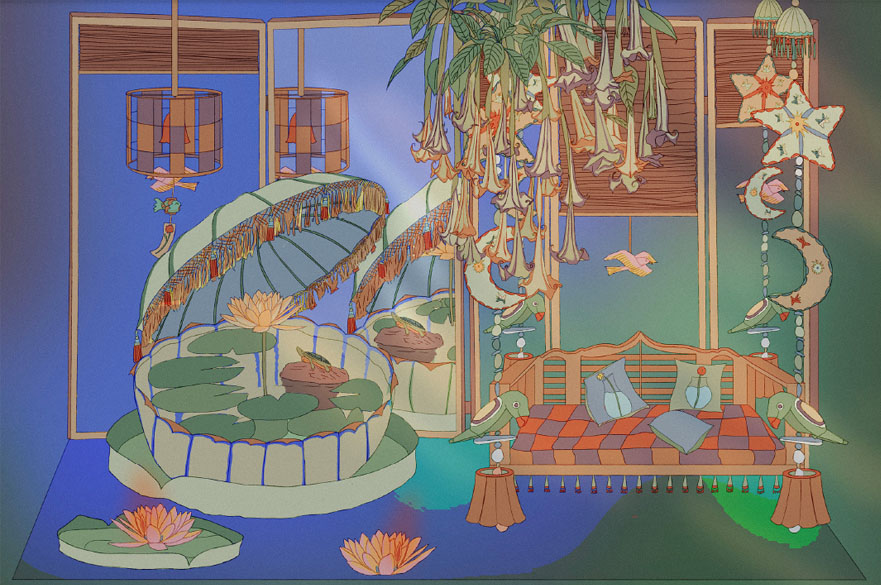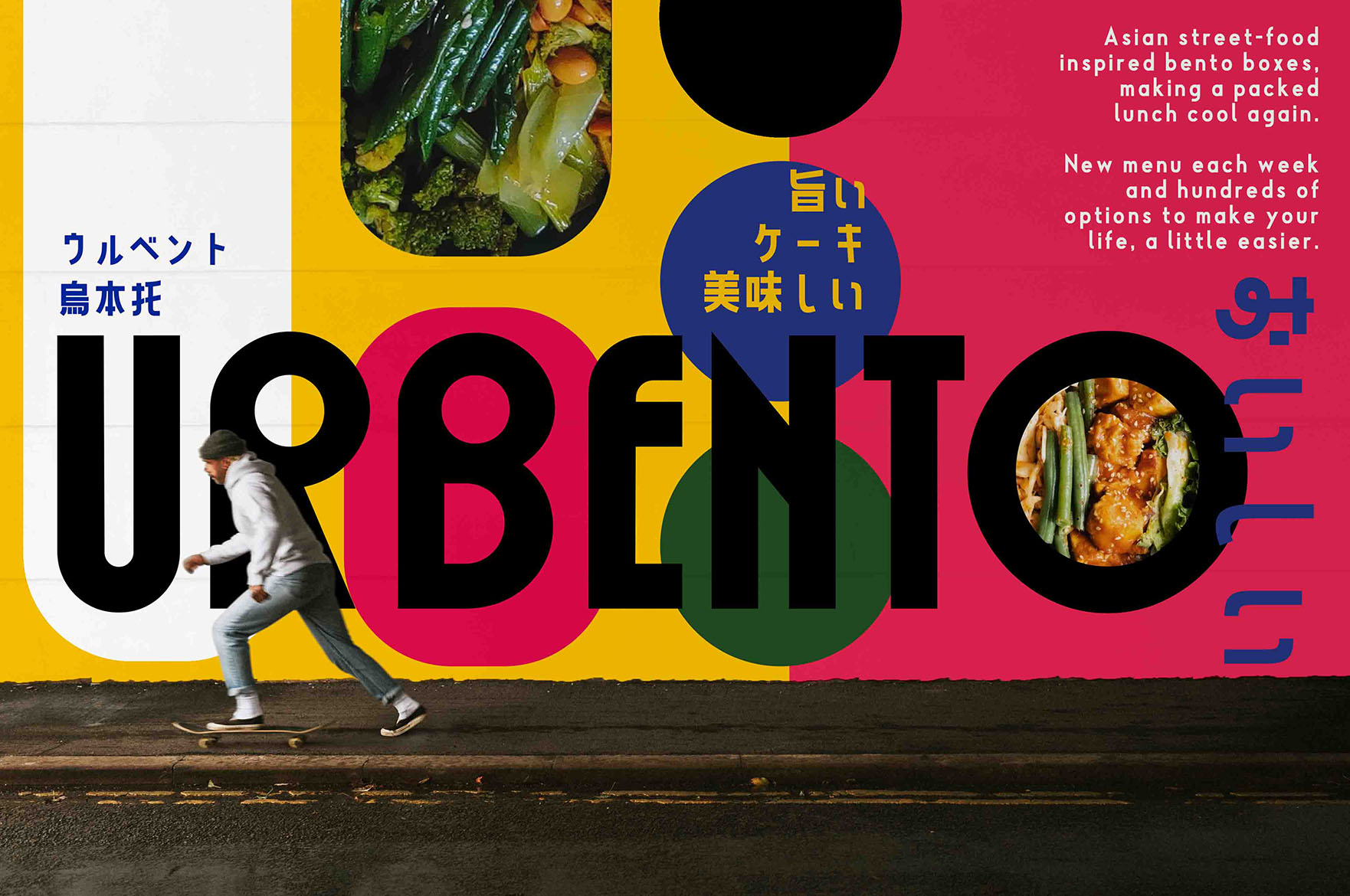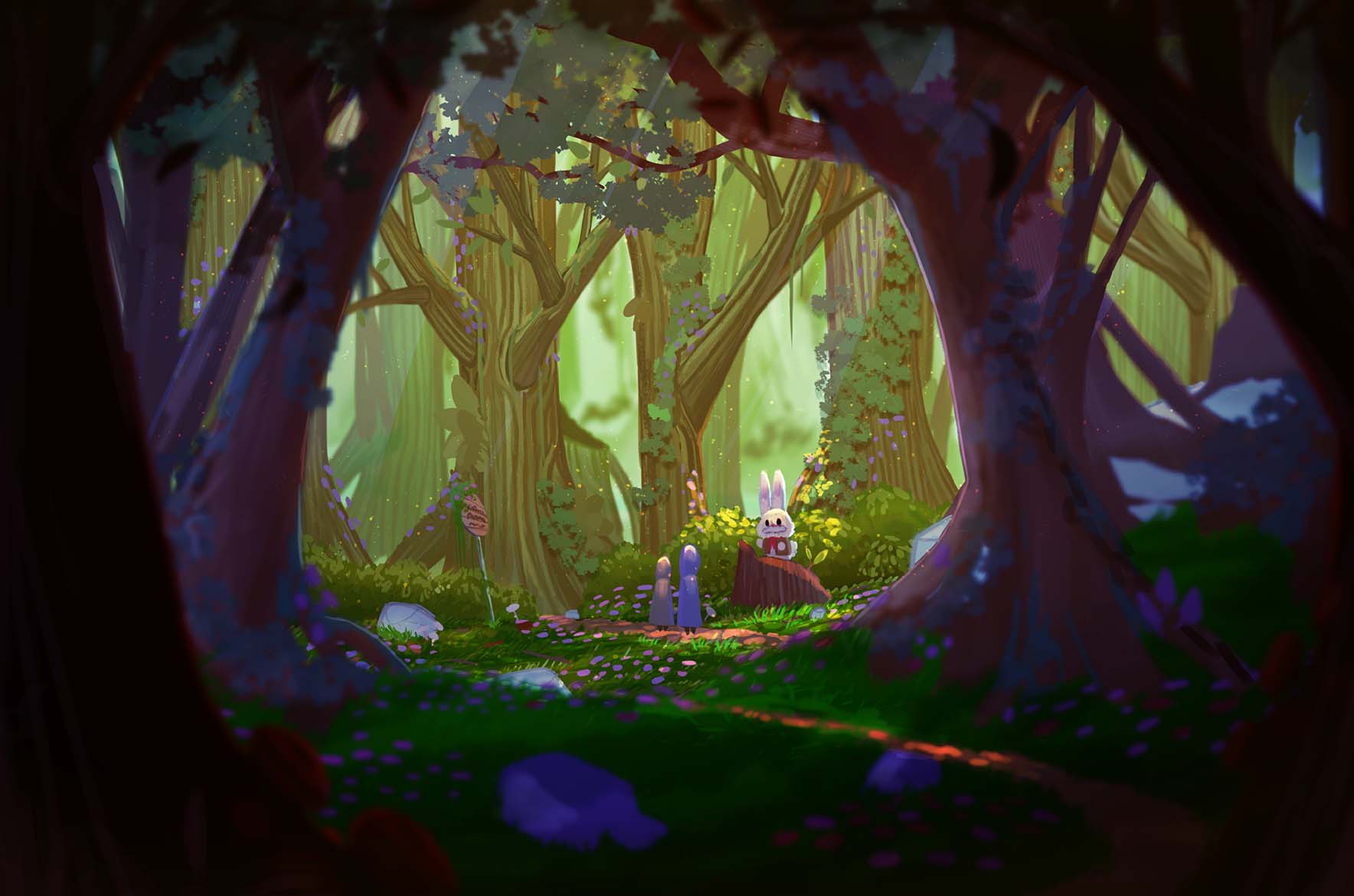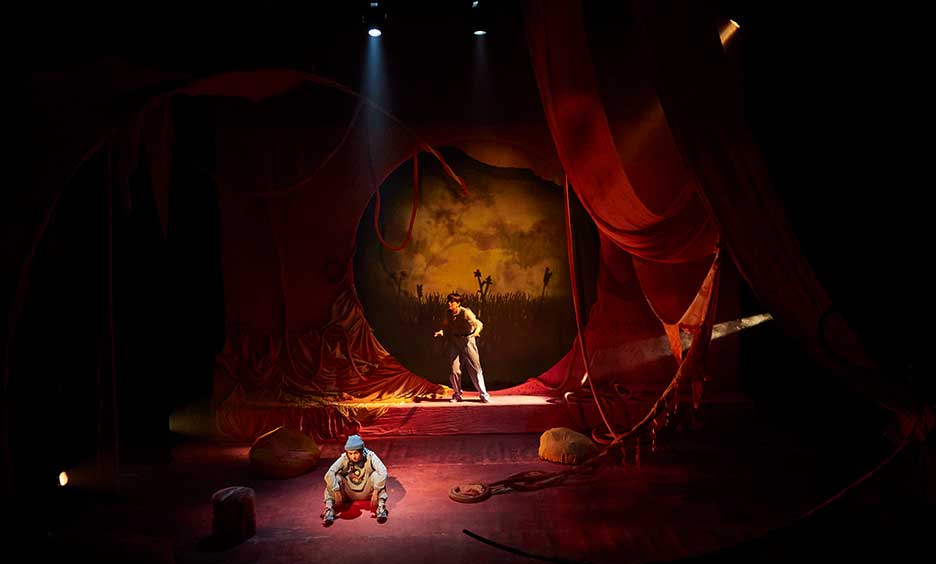Beat the Clearing queue
About this course
Explore what it means to be an artist in the 21st Century, considering the role of contemporary art in modern society. Develop your artistic work across the full range of contemporary fine art media, including drawing, installation, painting, sculpture, performance, photography, film, video, sound, and print.
Nottingham is internationally recognised as a vibrant hub for new and emerging artists and artist-led initiatives, boasting a diverse and thriving network of galleries, art spaces and artist collectives. Benefit from our links with such organisations locally, nationally and internationally by working on collaborative projects and enhancing your professional practice.
You’ll have the opportunity to enter competitions and exhibit your work globally. Our Fine Art graduates have played a big role in the development of the artistic network in Nottingham – there is direct correlation with the amount of art projects going on in the city and our alumni – a reciprocal ecosystem that future students can benefit from.
-
You’ll have the opportunity to complete a work experience placement of up to a year in length. Dependent on the duration of your placement, you could gain an additional Diploma or Certificate in Professional Practice.
-
Attend our Live Lecture Series, featuring national and international artists, creative practitioners and theorists. You will also benefit from our extensive links with festivals, art organisations and artists’ groups, nationally and internationally.
-
Go on optional study trips to destinations such as Berlin, and Copenhagen. You can also apply to study part of your degree abroad through our European or international exchange programmes.
-
Be inspired by Nottingham’s artistic community and creative places to visit, including Nottingham Contemporary, New Art Exchange and Lakeside Arts. You will also create connections with Nottingham’s wider art community through our alumni and staff network.
15
What you’ll study
Throughout the course, you’ll experiment with a range of media and then specialise and develop in your own area of interest.
There is an opportunity for students to undertake a placement year, and transfer to the Sandwich route, please see further details in the ‘Year Three’ section below.
Curiosity: Introducing Fine Art Practice
(100 credit points, full year)
The emphasis is on developing self-directed study, beginning with a series of workshops to kick-start your practice and help you to settle into your studies, allowing you to meet staff and fellow students. Explore with a sense of curiosity, creating work quickly and developing your ideas into more focused, self-negotiated fine art practice.
Deepen your awareness of the critical and professional contexts of fine art, and through project proposals and planning you’ll be introduced to the skills required for professional practice. Record and reflect on your work throughout the year to assemble a research portfolio.
Writing Contemporary Art: Review
(20 credit points, full year)
The module begins with an introduction to the gallery, studio and artist-collective platforms and contexts of contemporary art, starting with local venues and studios before considering the global scene and its histories. You will use and be shown different methods of writing to help generate research, record and reflect upon the work you experience, and describe its material and conceptual qualities. Seminal exhibition platforms will be explored and discussed in the lecture programme, in addition to studying reviews and critical writing excerpts, and learning about artistic research.
Speculation: Staging Fine Art Practice
(60 credit points, full year)
Building on your work in Year One, you will explore diverse methods of making and staging in the development of your work. In this module, an emphasis is placed on the contexts of exhibiting your work in and around the University, and in the wider city. You will also be encouraged and supported in generating an ethically sound and sustainable practice, in whatever processes and media you have chosen.
Writing Contemporary Art: Analysis
(20 credit points, full year)
The module begins with a series of themed lectures that explore a variety of different artistic practices that are grouped under three broad ‘rooms’ of enquiry: art and society, art and materiality, and art and history. Analyse the works and projects discussed within the contexts of their ‘room’ in order to examine, question and expose the methods adopted by the various artists, collectives and practices. At this level you will be shown how to critically engage with contemporary art landscapes and trends, to develop confidence and learn a critical vocabulary.
Co Lab: Research, Exploration and Risk-taking
(20 credit points, second half of the year)
Through active participation with team-based problem solving, you will work together in mixed teams on a project where you will use your creative ideas to generate solutions to the challenge or brief. Your project will allow you to explore how creativity can make an impact in society, as you choose a theme of sustainability, social justice, enterprise and innovation or community. This collaborative learning experience will expose you to a range of new processes and approaches that will develop your creative thinking.
Optional module
You will also personalise your course by choosing from a suite of 20-credit modules.
Depending on this choice, these modules will either develop your critical, theoretical and contextual understanding, or will broaden your technical and creative skill. Indicative modules include:
- Slow Making and Craftmanship
- Model Making: Object and Narrative
- Experimental Animation
- Responding to the Visual World
- Sound Art & Design
- Live Art / Collisions
- Drawing & Exploring with Natural Materials
- Ecological Futures: A Creative Response
Optional Placement Year (Sandwich)*
We have an option for all of our students to undertake a placement year (Sandwich) and allow you to decide whether this is right for you once you have completed years 1 and 2 of your course. This time spent working in industry provides our students with crucial work experience, which is highly prized and much sought after by employers upon graduation. If you are successful in securing a placement you will have the chance to gain an additional Certificate or Diploma in Professional Practice, dependent on duration.
The additional placement year incurs a fee. For international students considering the transfer to the 4-yr SW route it’s important to seek advice from the International Student Support team and the Home Office regarding any potential visa implications and costs. For UK students, advice should also be sought regarding SLC eligibility, if applicable.
* If you choose to take the sandwich route option, you will still need to apply for this course with the full-time UCAS code: W100.
Resolution: Final Practice and Reflection
(100 credit points, full year)
You will work independently towards a deeper understanding and resolution of your own practice, and identify and critically apply the questions, problems, methods and processes that are uniquely appropriate to your practice as you develop your own body of work. There is an emphasis on making and staging your own work within a professional contemporary art context, culminating in exhibiting your work in our Showcase. You will also focus on your own professional development, and identify future career opportunities.
Writing Contemporary Art: Research
(20 credit points, full year)
The module begins with lectures that are specifically focused to help you formulate a research question and develop an individualized proposal. A number of texts, exhibition platforms, projects and examples will be critically discussed in the opening lectures and seminars, that will guide you towards the formulation of a research question. At this stage your early research activities will be directed around an aspect of contemporary art (theory or practice) that interests you, and which may or may not have been covered by the lectures so far. By the end of the module you will have gained an understanding of where your own practice sits in relation to the wider cultural and critical voices you have exposed through your research.
We regularly review and update our course content based on student and employer feedback, ensuring that all of our courses remain current and relevant. This may result in changes to module content or module availability in future years.
Don’t just take our word for it, hear from our students themselves
Student Work
Video Gallery
How you're taught
You’ll spend most of your time in a creative studio environment. Teaching and learning experiences will include:
- individual and group tutorials and presentations
- year meetings
- Live Lecture programme
- technical advice and workshops
- visiting lecturer tutorials
- studio lecturer tutorials (sign-ups)
- career guidance
- organised study trips
- Showcase guidance.
- Experiment with different media before focusing on what is right for your own practice.
- Take part in local and international exhibitions and events, such as the Tilburg project in the Netherlands and Kunstpodium T programme.
- Have the support of academic and technical staff who are practising artists in their own right.
Co Lab
Want real-world experience alongside your degree? Co Lab is your opportunity to work with peers from different disciplines on live projects set by industry partners. Embrace collaborative practice as you explore how creativity can make an impact in society and develop the skills employers want to see in the creative industries.
Exchange opportunities and study trips
You’ll have the opportunity to go on a number of national and European trips during the course. Recent UK destinations have included Liverpool Biennial festival, Glasgow International festival, and various London galleries. European destinations have included Berlin and Copenhagen.
The course has exchange agreements with a number of institutions around the world, including Massey University in New Zealand, University of Lapland in Finland, and more. You can apply to go on exchange in Year Two for one semester.
A recent international masterclass programme has also given selected students the opportunity to work on a group project exhibiting in the Netherlands with students from across Europe.
Showcase
You will be given the opportunity to exhibit your work during your time at NTU to members of the creative industries. Visit our ‘We Are Creatives’ showcase to take a look at the work of this year's graduating students’.
How you're assessed
Assessment is a combination of practical and coursework across all years of study. Formative and summative assessment for practical modules involves the presentation of a body of practical work and a module portfolio. Both parts of the submission are graded holistically. For the contextual studies modules, submission for assessment will be based on coursework and other embedded written assignments. Assessment methods can include exhibitions, individual and group presentations, seminars and submission of written/visual material. Assessment methods used throughout the course reflect professional practice in the wider field and are designed to help you meet the course and module learning outcomes.
Careers and employability
A high proportion of graduates stay in Nottingham to pursue artistic activities. Many go on to become artists or work in roles such as curators, teachers, gallerists, animators, musicians, community artists, photographers and filmmakers. Some go on to use the skills and experience they’ve gained to enter careers in journalism, media, photography, web design, interiors, landscape design, and education.
Successful and notable graduates from this course include:
- film director Simon Ellis
- painter Nigel Cooke
- artist and illustrator Jon Burgerman
- curators Hannah Conroy and Ashley Gallant
- artists Tim Noble and Sue Webster
- award-winning landscape designer Sarah Price
- video artist Marianna Simnett
- artist Yoko Hayashi
- sculptor David Batchelor.
Professional practice and internship opportunities
You’ll have the opportunity to complete work experience or longer placement with external art organisations, galleries, and collectives, with the chance to gain an additional Diploma or Certificate in Professional Practice, dependent on duration. Course tutors and our Employability team are on hand to support you in applying for placement and professional practice opportunities. You’ll have access to:
- a database containing contacts for potential work placements
- collaborative opportunities for project development, exhibitions, and shows of work.
You will benefit from opportunities to collaborate on projects and exhibitions with a range of prestigious Nottingham institutions, including:
- Nottingham Contemporary
- New Art Exchange
- Broadway Cinema
- One Thoresby Street
- Primary
- Backlit
- Surface Gallery
- Nottingham Castle Museum & Art Gallery.
Fine Art students at NTU also benefit from collaborative opportunities with our staff and technicians.
YouFirst – working with our Employability team
Studying a creative degree in a large university has many benefits, none more so than having access to a large employability team.
Our friendly, experienced careers consultants will work closely with you at every stage of your career planning, providing personal support and advice you won't find in a book or on the internet. You can benefit from this at any time during your studies, and for up to three years after completing your course.
Creative Industries Federation
We are members of the Creative Industries Federation (CIF), which means students in the Nottingham School of Art & Design have the opportunity to sign up to free student membership. Creative Industries Federation are an organisation that represents, champions and supports the UK’s creative industries and membership grants students exclusive access to their selection of resources and events to help advance your career and connect with industry.
Links with the creative community
This course is set against the backdrop of Nottingham’s exceptionally strong contemporary art community. The city is internationally recognised as a centre of world-leading artistic innovation and creative business.
Over recent years, Nottingham has become a vibrant hub for new and emerging artists, boasting a diverse and thriving network of galleries, art spaces and artist led initiatives – many of which our graduates are involved with. A high volume of our graduating students choose to stay in Nottingham, developing career paths within the city’s art scene.
You’ll benefit from NTU’s wealth of contacts and links with regional and national art organisations, galleries, and collectives. Our Fine Art students have recently exhibited publicly at venues like Surface Gallery, Backlit, and One Thoresby Street, as well as other pop-up galleries in Nottingham and Internationally.
Live lectures
Our Live Lecture programme runs throughout all years of the course. It welcomes national and international artists, creative practitioners and theorists, including:
- Rachel Pimm
- Jeremy Deller
- Richard Wentworth
- Esther Leslie
- Pil and Galia Kollectiv
- Hetain Patel
- Rehana Zaman
- Harold Offeh
- John Newling
Competitions
Our Fine Art students enter competitions as available and relevant to their areas of practice. The main focus of this course is on developing collaborative relationships with external art organisations and practices.
Recent examples of competitions students have taken part in include the Woon Foundation Painting and Sculpture Prize, Harbin International University Snow Sculpture competition, the Saatchi Gallery's New Sensations, Bloomberg New Contemporaries, The Jerwood Drawing Prize, and the ING Prize.
Campus and facilities
Our Fine Art students are based in the Bonington building, a dedicated art and design building. View our Nottingham School of Art & Design Facilities Hub here.
Entry requirements
UK students
- Standard offer: 112 UCAS Tariff points from up to four qualifications
- Contextual offer: 104 UCAS Tariff points from up to four qualifications
Other requirements
To find out what qualifications have tariff points, please use our tariff calculator.
Additional requirements for UK students
There are no additional requirements for this course.
Contextual offers
If you don’t quite meet our entry requirements, we might be able to make you a lower offer based on a range of factors, including your background (such as where you live and the school or college you attended), your experiences and your individual circumstances (you may have been in care, for example). This is called a contextual offer, and we get data from UCAS to help make these decisions. We do this because we believe everyone with the potential to succeed at NTU should have the opportunity to do so, no matter what barriers you may face.
Meeting our entry requirements
Hundreds of qualifications in the UK have UCAS Tariff points attached to specific grades, including A-levels, BTECs, T Levels and many more. You can use your grades and points from up to four different qualifications to meet our criteria. Enter your predicted or achieved grades into our Tariff calculator to find out how many points your qualifications are worth.
Other qualifications and experience
NTU welcomes applications from students with non-standard qualifications and learning backgrounds, either for year one entry or for advanced standing beyond the start of a course into year 2 or beyond.
We consider study and/or credit achieved from a similar course at another institution (otherwise known as credit transfer), vocational and professional qualifications, and broader work or life experience.
Our Recognition of Prior Learning and Credit Transfer Policy outlines the process and options available for this route. If you wish to apply via Recognition of Prior Learning, please contact the central Admissions and Enquiries Team who will be able to support you through the process.
Getting in touch
If you need more help or information, get in touch through our enquiry form.
International students
Academic entry requirements: 112 UCAS Tariff points from up to four qualifications. We accept equivalent qualifications from all over the world. Please check your international entry requirements by country
Other requirements
English language requirements: See our English language requirements page for requirements for your subject and information on alternative tests and Pre-sessional English.
Additional requirements for international students
If you need help achieving the academic entry requirements, we offer a Foundation preparation course for this degree. The course is offered through our partner Nottingham Trent International College (NTIC) based on our City campus.
English language requirements
View our English language requirements for all courses, including alternative English language tests and country qualifications accepted by the University.
If you need help achieving the language requirements, we offer a Pre-Sessional English for Academic Purposes course on our City campus which is an intensive preparation course for academic study at NTU.
Other qualifications and experience
If you have the right level of qualifications, you may be able to start your Bachelors degree at NTU in year 2 or year 3. This is called ‘advanced standing’ entry and is decided on a case-by case basis after our assessment of your qualifications and experience.
You can view our Recognition of Prior Learning and Credit Transfer Policy which outlines the process and options available, such as recognising experiential learning and credit transfer.
Sign up for emails
Sign up to receive regular emails from the International Office. You'll hear about our news, scholarships and any upcoming events in your country with our expert regional teams.
Getting in touch
If you need advice about studying at NTU as an international student or how to apply, our international webpages are a great place to start. If you have any questions about your study options, your international qualifications, experience, grades or other results, please get in touch through our enquiry form. Our international teams are highly experienced in answering queries from students all over the world.
Policies
We strive to make our admissions procedures as fair and clear as possible. To find out more about how we make offers, visit our admissions policies page.
